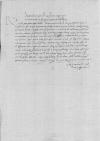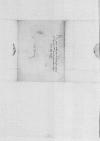List #5693
Sigismund I Jagiellon do Ioannes DANTISCUSCracow (Kraków), 1538-05-29
| odebrano [1538]-06-09 Rękopiśmienne podstawy źródłowe:
| ||||
Tekst + aparat krytyczny + komentarzZwykły tekstTekst + komentarzTekst + aparat krytyczny
Reverendo in Christo Patri, domino
Reverende in Christo Pater, sincere nobis dilecte.
Pergratum fecit nobis Paternitas Vestra, quod profectionem suam
ad serenissimum
Misimus cubicularium nostrum ad serenissimum
De reliquis visum est coram potius quam per litteras cum Paternitate Vestra colloqui. Quam bene valere optamus atque iter illi felix precamur utque ea, quae dedimus illi mandata, feliciter tractet atque ad optatum finem perducat.
Dat(um) or Dat(ae)⌈Dat(um)Dat(um) or Dat(ae)⌉
Ad mandatum s(acrae) or s(erenissimae)⌈s(acrae)s(acrae) or s(erenissimae)⌉ maiestatis regiae proprium


 BNW, BOZ 953, f. 166v.
BNW, BOZ 953, f. 166v.